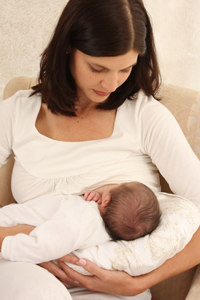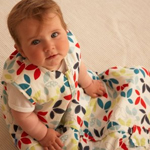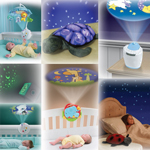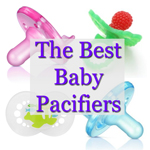 Breast feeding is one of the most important advantages you can give your baby from day one. Well, from day two or three, to be accurate (breast milk doesn’t usually come in right away).
Breast feeding is one of the most important advantages you can give your baby from day one. Well, from day two or three, to be accurate (breast milk doesn’t usually come in right away).
All three of our children were breastfed for at least 6 months. I’m a huge proponent of breast feeding, and in this article, I’ll tell you why.
Contents:
Benefits of Breast Feeding
Breast Feeding Tips
When and How to Stop Breast Feeding
Benefits of Breast Feeding
There are many, many reasons that you should breast feed your baby, but here are some of the most important benefits:
- Breast milk is the best food for babies. Not only is it naturally made, but it’s completely digestible and contains every nutrient that your baby needs to be healthy.
- Breast feeding promotes natural immunity. When you breast feed your baby, you provide him with macrophages and lymphocytes, two kinds of immune system cells that fight infections and produce antibodies.
- Mother and baby bond while breast feeding. There is no denying that the act of breast feeding itself provides some special bonding time between mom and baby. You’ll become known as “she who provides food” and with babies, that’s the most important person in the world.
- The convenience of breast feeding. Breast milk is always at the right temperature, usually available, and generally doesn’t require a bottle. You can breast feed a baby almost anywhere (though investing in a nursing cover is a good idea for when you’re out in public). There’s no prep time, which makes it especially convenient at night. You can let a newborn sleep in a mini crib or bassinet in your room to help with those overnight feedings.
- Breast feeding saves money. Yes, you’ll eat more while breast feeding, but the cost of adult food is nothing next to the cost of infant formula. Even if you buy in bulk and avoid the fancy easy-digestion or all-organic formulas, that stuff, you’ll save $40-60 per month at a minimum by breast feeding.
- Reduce the risk of breast cancer. Breast feeding has been associated with a slightly reduced risk of breast cancer, particularly when continued for 1-2 years after your baby is born.
Breast Feeding Tips
Breast feeding may come naturally to you, especially if you’ve done it before. Here are a few tips to help you find success:
- Be patient. Breast milk usually comes in 2-3 days after the baby has been born. Until then, you’ll get the nutrient-rich but volume poor colostrum, which doesn’t amount to much. Still, it’s important to keep trying several times a day – the contact and sucking from your baby will stimulate your body and speed things along.
- Invest in a good breast pump. A breast pump is helpful for getting started nursing, and for stockpiling milk when it comes in (you’ll probably be making more than your newborn can eat at first). You can get entry-level breast pumps for around $100. You can get the hand pumps for even cheaper, but those are a joke. You’ll want a quality double pump like the Medela Pump In Style, which we’ve used for all three kids. If it helps you with breast feeding, this thing will pay for itself.
- On a related note, stockpile breast milk whenever you can. In the first month or two, you’ll probably have a surplus of milk. You can pump it into Medela storage bottles and freeze it for any time that you’ll be away from your baby or he’s hungrier than usual.
- Make a schedule and stick to it. You can nurse the baby whenever, but sticking to a 3-hour or 4-hour schedule will help with milk production; it lets your baby drink all of the milk and tells your body to keep replenishing it. You can, and should, pump what your baby doesn’t drink. Keeping a regular schedule is also good for establishing baby sleep patterns, which will pay off huge when your baby starts sleeping longer.
When and How to Stop Breast Feeding
Experts will tell you to nurse your baby as long as you can, for 1-2 years if possible. Realistically, I think that nursing the first 12 months is a good goal. If you can do more than that, great! That’s more time to enjoy the benefits above. By 12 months, though, a few factors will probably make you ready to stop breast feeding:
- Can’t keep up. Your baby’s appetite will grow as he does. Eventually, he or she will need more than you can produce between feedings, and this may cause some frustration.
- Baby is teething. Your baby will start getting teeth sometime between the age of 6-9 months. This adds a real “ouch” factor to breast feeding, especially when they have teeth on the top and bottom. For more on this, see what to do when your baby is teething.
- Baby fights nursing. This has happened to us – the boys just suddenly wouldn’t nurse even when they were hungry. It might have to do with hormonal changes in the body, but when your baby just refuses to drink, the nursing period may be over.
When you decide to stop nursing, there’s no special trick. You stop cold-turkey and expect a day or two of discomfort. And then it’s over, and things should return to normal for you.
What To Read Next
If you like this article, you might want to subscribe by e-mail or RSS so that you’re notified when new content is posted.
 |
 |
 |
 |
| Learn about the benefits and bestsellers of baby sleep sacks and sleeping bags. | Projection Night Lights keep your baby entertained while in the crib and help soothe him back to sleep. | Best Baby Pacifiers has our recommendations for newborns, older babies, and teething infants. | Visit our sleep training section for strategies and tips for teaching your baby to sleep through the night. |
